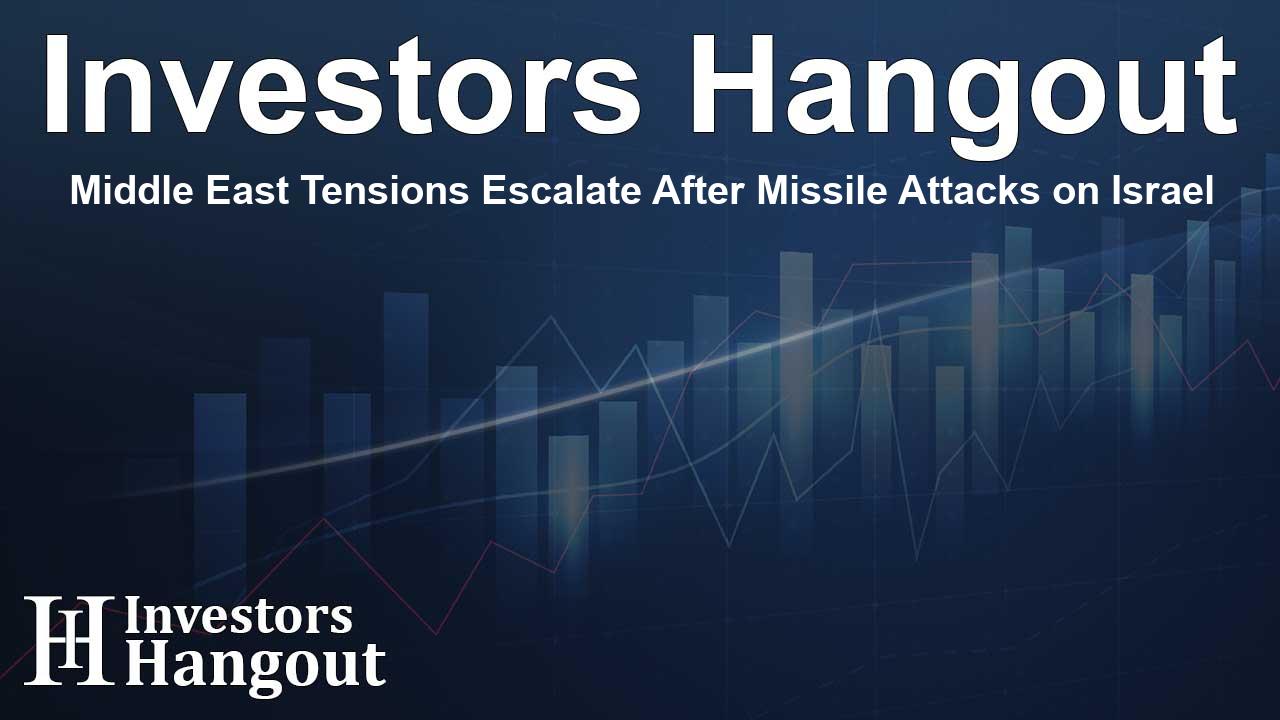Middle East Tensions Escalate After Missile Attacks on Israel

Growing Tensions in the Middle East
Recent events have dramatically heightened tensions in the Middle East, particularly following a missile strike on Israel. Israeli Prime Minister Benjamin Netanyahu has firmly stated that there will be repercussions against Iran for launching over 180 missiles into Israeli territory. This alarming escalation comes with Iran warning of 'vast destruction' should Israel decide to retaliate, intensifying fears of a larger regional conflict.
The Impact of the Missile Attacks
In the wake of the missile barrage, fortunately, no injuries were reported in Israel, though casualties have emerged from the occupied West Bank. Iran's foreign ministry has claimed that its missile operation was defensive, aimed specifically at Israeli military targets rather than civilian areas.
Israel's Response
Israel's ambassador to the United Nations has declared that the nation will choose the timing and nature of its response to the missile assault. He emphasized the retaliation would be noticed and painful for Iran. This statement underscores Israel’s commitment to defending its citizens and ensuring that aggressive actions do not go unchallenged.
Iran’s Position and Threats
Iran's military leadership has responded strongly, indicating that any direct confrontation with its supporters could lead to serious repercussions. General Mohammad Bagheri has made it clear that if Israel takes further actions against Iran, they will target all of Israel’s infrastructure with an intensified missile response. This statement reflects a determination from Tehran not only to defend itself but also to project strength in the face of perceived threats.
Broader Implications
The recent attacks are a part of a larger pattern of escalating violence and hostility in the region. Prior to the missile strike, the United States increased its military presence in anticipation of potential conflict, sharing its concerns about the imminent threat in the region. These developments have significant implications for global markets.
Market Reactions to the Escalating Conflict
As the situation unfolds, we have already seen notable shifts in market trends. Gold and oil prices surged in reaction to the missile attacks, indicative of investor anxiety regarding the stability of the region. The United States Oil Fund registered a 3% increase, while the SPDR Gold Trust saw a rise of 1%. In contrast, major indexes faced declines, particularly the SPDR S&P 500 ETF (SPY), which fell by 0.9%, and the Invesco QQQ Trust (QQQ), down by 1.4%. Technology stocks experienced the most significant drops, while defense and oil sectors experienced gains.
Current Market Conditions
As of now, the SPY is trading approximately 0.15% lower in after-hours sessions, priced at $567.74, while QQQ is slightly down by about 0.3%, sitting at $480.01. This reflects a cautious market that is responding to both geopolitical tensions and their potential impact on economic stability.
Conclusion
As the situation develops, the world watches closely. The potential for retaliation and further military action could lead to even more significant disruptions—not just in the Middle East but globally. Stakeholders from all sectors are advised to remain vigilant as the implications of these actions continue to unfold.
Frequently Asked Questions
What sparked the recent missile attacks between Iran and Israel?
The recent missile attacks resulted from escalating tensions, with Israel responding to missile strikes by Iran targeting military facilities.
How has Israel responded to the missile attacks?
Israeli PM Netanyahu has pledged a firm retaliation against Iran, emphasizing that the response will be significant and impactful.
What did Iran say regarding the missile attacks?
Iran claimed the missile launches were defensive and threatened significant consequences if Israel escalated the situation further.
How are global markets reacting to these developments?
Markets have shown volatility, with oil and gold prices increasing due to concerns over regional stability, while tech stocks have seen declines.
What are the implications of this conflict for investors?
Investors should be cautious as geopolitical tensions can lead to market volatility, affecting industries such as technology and energy.
About Investors Hangout
Investors Hangout is a leading online stock forum for financial discussion and learning, offering a wide range of free tools and resources. It draws in traders of all levels, who exchange market knowledge, investigate trading tactics, and keep an eye on industry developments in real time. Featuring financial articles, stock message boards, quotes, charts, company profiles, and live news updates. Through cooperative learning and a wealth of informational resources, it helps users from novices creating their first portfolios to experts honing their techniques. Join Investors Hangout today: https://investorshangout.com/
Disclaimer: The content of this article is solely for general informational purposes only; it does not represent legal, financial, or investment advice. Investors Hangout does not offer financial advice; the author is not a licensed financial advisor. Consult a qualified advisor before making any financial or investment decisions based on this article. The author's interpretation of publicly available data shapes the opinions presented here; as a result, they should not be taken as advice to purchase, sell, or hold any securities mentioned or any other investments. The author does not guarantee the accuracy, completeness, or timeliness of any material, providing it "as is." Information and market conditions may change; past performance is not indicative of future outcomes. If any of the material offered here is inaccurate, please contact us for corrections.